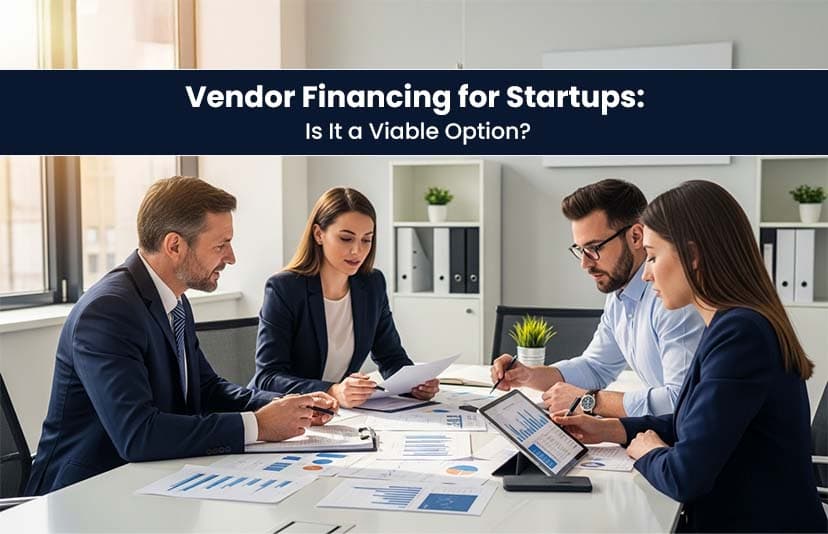Start-ups are constantly confronted by the problem of obtaining adequate and timely capital necessary to operate and grow. Traditional capital sources, such as bank loans and venture capital, may not be available because of strict regulations and long approval times, which is where vendor financing can be a flexible option to alleviate working capital pressures.
What is Vendor Financing for Startups
Vendor financing is a financing arrangement in which a vendor (supplier) agrees to allow a startup to obtain goods or services immediately, but makes payment on a later date and under mutually accepted credit terms.
Rather than fronting the vendor payment as usual, the startup can defer payment, opt for installment payments, or lease to maintain healthy cash flow while navigating the early stages of their business. Vendor financing for startups provides cash flow by relying on the mutual agreement of the business relationship and acceptance of reasonable risk from the vendor, without requiring the extensive credit history or collateral that traditional lenders demand.
Types of Vendor Financing for Startups
Depending on the operations requirements and vendor capabilities, there are different vendor financing options for startups, including:
- Deferred Payments: Payment can be made in 30, 60, or 90 days, which allows the startup a sufficient amount of time to create new revenue before it pays it back.
- Installment Payments: The payment sum is split into predetermined monthly payments. This cannot only be used for budgeting purposes but is also a cash flow management tool.
- Lease-Rent to Own: Startups are able to lease costly equipment or technology without upfront capital requirements, and can choose to purchase it later.
- Purchase Order Financing: Vendors will finance the production or procurement of products or services against confirmed orders, which allows them to fulfill customer demands while maintaining working capital for startups.
- Equity or Revenue-Sharing Arrangements: Some startups negotiate vendor credit in exchange for equity or a share of revenue, aligning the vendor’s interests with the startup’s growth.
Why Vendor Financing is a Smart Choice for Startups?
Vendor financing for startups is a good match and offers numerous advantages, such as:
- Improved Working Capital Management: Startups can purchase necessary inventory, equipment, or services without an upfront cash outlay, meaning that cash is free to be utilized for everyday operations and working capital for startups.
- Lower Cost of Capital: Vendor financing will usually have flexible schedules and zero or low interest terms, which means it is likely to be less costly than high-interest loans or the dilution of equity in their startup capital.
- Better Vendor Relationships: When businesses are capable of establishing a regular operating partner with vendor financing, they can develop loyalty and trust that can offer additional advantages, such as better credit limits or larger inventory availability.
- Improved Responsiveness: Startups that utilize vendor financing can obtain the needed resources to launch products and sell without causing any cash flow choke points.
Key Considerations and Challenges
While vendor financing is appealing, startups will also have to manage the following issues if they are to take advantage of it:
- Exercise Cash Flow Stewardship: If payments are delayed, your liabilities will be increased, and you will have to continue with cash flow predictions and governance challenges to avoid defaults or penalties.
- Credit Restrictions: Certain vendors cap the amount of credit they extend, based on their risk calculations and volume of sales, thereby restricting startup capital growth.
- Relationship Damage: Delays or defaults can damage relationships, impacting their willingness to supply your inventory obligations moving forward.
Best Practices for Startups Using Vendor Financing
To establish vendor financing as a successful startup funding practice, they should adopt the following key strategies:
- Communication: Be up-front with all of your vendors and provide transparency to your financial position regarding payment schedule and health so that you can rely on a positive relationship with that vendor.
- Payment Terms Consistent With Receivable Cycle: Negotiate the vendor financing arrangement with payment terms that align with your expected cash inflow cycle to manage working capital for startups effectively.
- Planning: Utilize a comprehensive cash management system that helps forecast liabilities to stay on top of the payment obligations for the vendor.
- Diversification of Sources of Funding: Avoid getting locked into positions where you only utilize one vendor or funding option, and consider leveraging the additional startup funding sources.
- Utilization of Technology: Use digital platforms that provide fast approvals, flexible repayment, and startup-focused financing options.
Credlix: Enabling Startup Success Through Vendor Financing
Credlix leverages innovative technologies to deliver vendor financing for startups that is anchored to invoices and free of collateral. The key features offered through Credlix enable the following:
- Efficient evaluation of credit requests and the fast disbursement of funds, minimizing waiting time for funding.
- Flexible credit limits that improve working capital for startups.
- Easy accessibility with integration to existing ERP and invoicing systems, where you get accurate, real-time information regarding access to financing for vendor payments.
- Clarity in the terms of the financing offer and the flexibility in repayment terms.
By leveraging Credlix’s services, startups can sustain a healthy working capital, operate more efficiently, and foster favourable supplier relationships to reduce the startup capital pitfalls.
Powering Startup Growth with Trusted Vendor Financing
Vendor financing for startups represents a more flexible, accessible, and affordable type of financing, and fits well into the cash flow realities that startups face. It enables an early-stage startup to purchase the products or services they need without having to take cash away from other operating commitments to fund supplies so they can continue to scale their business. Startups that work with an innovative platform such as Credlix get customized vendor financing products that simplify funding, strengthen supplier relationships, and boost a startup’s chances of success.
Start benefitting from Credlix’s vendor financing services to increase the growth of your startup while preserving invaluable working capital.
Frequently Asked Questions
- What are the favorable aspects of vendor-financed buys for startups?
Vendor financing allows a startup to obtain products or services from a vendor and to pay for them under mutually agreed-upon credit terms, enabling the startup to manage cash flow.
- What forms of vendor financing can startups access?
There are many different forms, such as deferred payments, installment plans, leasing, purchase order financing, or a mix of equity or revenue-sharing agreements.
- What risks do startups have to assess with vendor financing?
Risks include poor cash flow management, credit limits, possible tension with their vendor partner, and the possibility that vendor terms won’t match standard creditor agreements.




